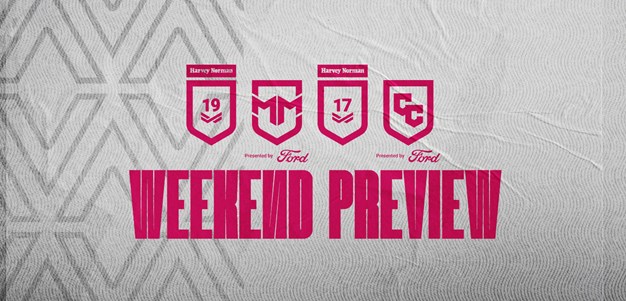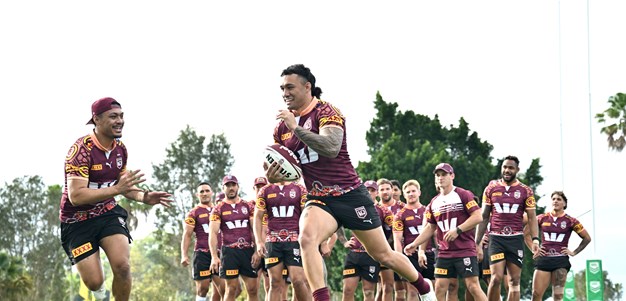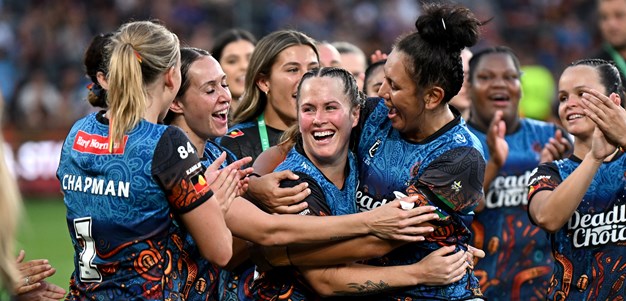The people of the Torres Strait Islands live and breathe rugby league. It’s part of who they are, woven into the fabric of their community.
Queensland Rugby League Cape and Torres league and club coordinator Terry Abednego describes it as an equivalent to Papua New Guinea, where rugby league is the national sport.
“It’s the pinnacle of all sport up here,” Abednego said of the Torres Strait.
“It has become part of our culture. When you’re here, you see a lot of people wearing rugby league jerseys. It’s a small version of PNG.
“They are real footy crazy up this way.”
But despite their great love and admiration for the game, rugby league is something the kids of the Torres Strait don’t get to experience enough of.
Across the five clusters of islands, the only regular competition for juniors is on Thursday Island, with children from the other four clusters only really getting the opportunity to play the game formally at a limited number of carnivals throughout the year - and that’s only if you’re selected to go.

Abednego said the high cost of living and the geographic nature of the Torres Strait made it difficult to get rugby league up and running - but that also did not make it impossible.
Recent junior development carnivals, hosted by the Queensland Rugby League and the NRL in conjunction with committees and rugby league clubs from the Torres Strait, have highlighted once again just how much the game means to this community.
It looks like you may be using adblocking software to view this site.
Many features on the site, such as video playback, may not work properly when using adblocking software.
Please whitelist our domain or disable your adblocker to access all features and videos.
QRL visit Mabuiag and Yam Islands
Held in the first week of April, Abednego and teams from the QRL and NRL travelled to Yam and Mabuiag islands, engaging in footy clinics, wellbeing sessions, colour runs and general life skills with kids in the under 10s and under 12s age groups.
Abednego said every single child thrived in the environment – even surprising him with their eager willingness to wake up early.

“On one of the islands they had their colour fun run at six o’clock in the morning,” he said.
“I thought some of the kids wouldn’t come but they were all there, every one of them. They just want more of it. They were very excited and happy.
“Not to have regular footy happening with them is hard. Rugby league is everything up here.
“This was the first time ever some of them were by themselves, without their parents. They learnt life skills – to wake up, make your bed, brush your teeth without being told.
“They had the rugby league component where they got to learn skills and all the basic stuff. We had the colour fun runs for both camps.
“There were team bonding activities and cultural sessions with some of the elders in the community, teaching them about identity, who they are, and getting them ready to go to high school or what to expect when they go down south.
“Our kids when they leave here, they’re so raw when they go to high school. They’re one or two age groups below with their ability but they peak at an older age, like Sam Thaiday or Johnathan Thurston.
“I’ve had a lot of parents who have called me since to say thank you. It was about providing them with the opportunity to play or even just participate. It was very worthwhile.”

The initial camps launched in 2019, but have been cancelled the past two years due to COVID. However, the return of the development opportunities this year have started many conversations around how to bring more rugby league to Torres Strait Islander children, including future camps and a junior competition.
Abednego said there were certainly obstacles that needed to be cleared, with some groups having to raise over $10,000 just to travel to the camps last month.
“These camps were designed because it’s the only sort of structured football and rugby league they get,” Abednego said.
“We have a strong junior rugby league competition on Thursday Island for the inner islands, so it’s the four other clusters that we are targeting just to give the kids some footy.
“It was well received by the communities and they’re asking for more, but it’s a bit hard to organise it. It was a challenge just getting gear up from down south.
“It’s the high cost of living up this way. It was a good experience not only for the organisers and kids, but the staff visiting to experience how things are done and the geographic nature of this area and how challenging it is just to play a game.
“One of our groups had to spend $13,000 just to get to the camp. That was eight kids and a couple of supervisors. That highlights how hard and challenging it is.
“But a lot of comments that came out of the camps were saying they need more of this. The community support is there.”

Since the camps, a number of organisations have seen social media photos and videos and reached out regarding sponsorships or services for future.
Queensland Police Service have spoken to Abednego about what they can offer, including water transport between the islands, while local health agencies and Australian Maritime Safety Authority have also been in touch.
Abednego said volunteers among the islands were now more equipped and trained for organising and planning their own events, while the senior rugby league clubs also helped plan the camps and now had experience in that area.
While there are hopes the junior development camps will become an annual event, a group is also being formed in an attempt to establish an outer islands junior rugby league competition, with their first meeting to be held next month.

“This is part of growing the game and having something structured for these kids,” Abednego said.
“Our first meeting will be in mid-June around some planning for next year or whenever we can get it up and running. Some of the challenges we face are the travel and the cost just to play footy. There’s only one or two islands with a rugby league field on it as well, so that makes it a bit harder.
“We’re working in partnership with the Torres Strait Island Regional Council and healthy lifestyle officers … they’ve been a lot of help. We’re looking at whether they can play within their clusters one week and two weeks later play amongst the islands.
“It would maybe be a 10 game program - 10 games across 20 weeks. It would just give them some regular footy and include the younger kids, around under 6s and under 8s.”
The kids from the outer islands who participated in the junior development camps have also been selected in under 10s and under 12s teams and will get the opportunity to head to Thursday Island in conjunction with the QRL’s Activate Queensland! Country Week.
They will play in a small junior carnival ahead of the July 23 Hostplus Cup clash between Northern Pride and Souths Logan Magpies.
QRL North region manager, Renae Kunst, said the success of the recent camps illustrated the need to continue pushing for more rugby league in the region.
“It’s important to us as a northern region that our game has a reach far and wide and the ability to be able to offer experience to our most remote islands is something quite special,” Kunst said.
“What I love seeing is that not only is it impactful to the kids in the camps but the people who are helping run those camps. It’s a great thing and something we hope to continue.”

The QRL and NRL worked in collaboration to run the junior development camps, with Abednego joined by Far North Queensland area manager, Robbie Moore, and northern wellbeing operations manager, Dave Sheridan, from the QRL, and Mako Roberts, Brennan Brown and Neil Richards from the NRL.
Main image: Kids after the colour fun run on Yam Island. Photo: Magun Warriors Facebook/QRL







